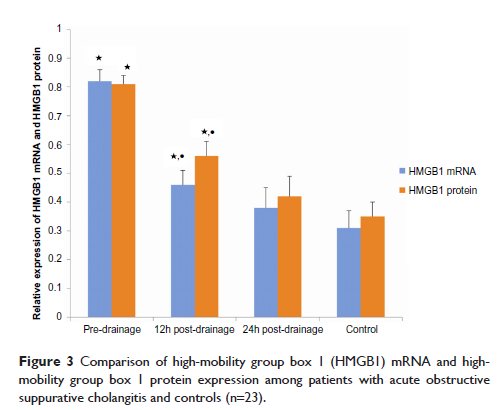109669
论文已发表
注册即可获取德孚的最新动态
IF 收录期刊
- 3.4 Breast Cancer (Dove Med Press)
- 3.2 Clin Epidemiol
- 2.6 Cancer Manag Res
- 2.9 Infect Drug Resist
- 3.7 Clin Interv Aging
- 5.1 Drug Des Dev Ther
- 3.1 Int J Chronic Obstr
- 6.6 Int J Nanomed
- 2.6 Int J Women's Health
- 2.9 Neuropsych Dis Treat
- 2.8 OncoTargets Ther
- 2.0 Patient Prefer Adher
- 2.2 Ther Clin Risk Manag
- 2.5 J Pain Res
- 3.0 Diabet Metab Synd Ob
- 3.2 Psychol Res Behav Ma
- 3.4 Nat Sci Sleep
- 1.8 Pharmgenomics Pers Med
- 2.0 Risk Manag Healthc Policy
- 4.1 J Inflamm Res
- 2.0 Int J Gen Med
- 3.4 J Hepatocell Carcinoma
- 3.0 J Asthma Allergy
- 2.2 Clin Cosmet Investig Dermatol
- 2.4 J Multidiscip Healthc

已发表论文
高迁移率族蛋白 b1 在急性梗阻性化脓性胆管炎引起的败血症患者
Authors Singh A, Feng Y, Mahato N, Li J, Wu C, Gong J
Published Date March 2015 Volume 2015:8 Pages 71—77
DOI http://dx.doi.org/10.2147/JIR.S77539
Received 14 November 2014, Accepted 20 January 2015, Published 11 March 2015
Approved for publication by Dr Ning Quan
Background: High-mobility group box 1 (HMGB1) is a proinflammatory cytokine that plays an active role during the pathogenesis of inflammatory processes. The primary aim of this study was to detect whether HMGB1 is involved in the pathogenesis of acute obstructive suppurative cholangitis (AOSC).
Methods: We collected peripheral blood samples from 23 patients with AOSC and 23 healthy volunteers who served as normal controls. All participants were tested for HMGB1 mRNA level, HMGB1 protein, tumor necrosis factor alpha (TNF-alpha), and interleukin 10 (IL-10). HMGB1 mRNA levels were tested using real-time polymerase chain reaction. HMGB1 protein expression was measured using Western blot. TNF-alpha and IL-10 were tested using enzyme-linked immunosorbent assay.
Results: The expression of HMGB1 mRNA and HMGB1 protein was higher in the AOSC group than in the normal controls (P <0.01), and the levels gradually decreased to normal after treatment of the disease (P <0.01). The content of TNF-alpha and IL-10 in peripheral blood of patients with AOSC was significantly higher than that of normal controls (P <0.01) but decreased to normal levels after the necessary treatment (P <0.01).
Conclusion: The levels of HMGB1 mRNA and HMGB1 protein were elevated in patients with AOSC, which may play an important role in the inflammation of the bile duct and appears to be associated with the development of sepsis. This suggests the importance of monitoring HMGB1 levels in the management of AOSC-induced sepsis.
Keywords: AOSC, HMGB1, interleukin 10, TNF-alpha, sepsis, inflammation
Methods: We collected peripheral blood samples from 23 patients with AOSC and 23 healthy volunteers who served as normal controls. All participants were tested for HMGB1 mRNA level, HMGB1 protein, tumor necrosis factor alpha (TNF-alpha), and interleukin 10 (IL-10). HMGB1 mRNA levels were tested using real-time polymerase chain reaction. HMGB1 protein expression was measured using Western blot. TNF-alpha and IL-10 were tested using enzyme-linked immunosorbent assay.
Results: The expression of HMGB1 mRNA and HMGB1 protein was higher in the AOSC group than in the normal controls (P <0.01), and the levels gradually decreased to normal after treatment of the disease (P <0.01). The content of TNF-alpha and IL-10 in peripheral blood of patients with AOSC was significantly higher than that of normal controls (P <0.01) but decreased to normal levels after the necessary treatment (P <0.01).
Conclusion: The levels of HMGB1 mRNA and HMGB1 protein were elevated in patients with AOSC, which may play an important role in the inflammation of the bile duct and appears to be associated with the development of sepsis. This suggests the importance of monitoring HMGB1 levels in the management of AOSC-induced sepsis.
Keywords: AOSC, HMGB1, interleukin 10, TNF-alpha, sepsis, inflammation
